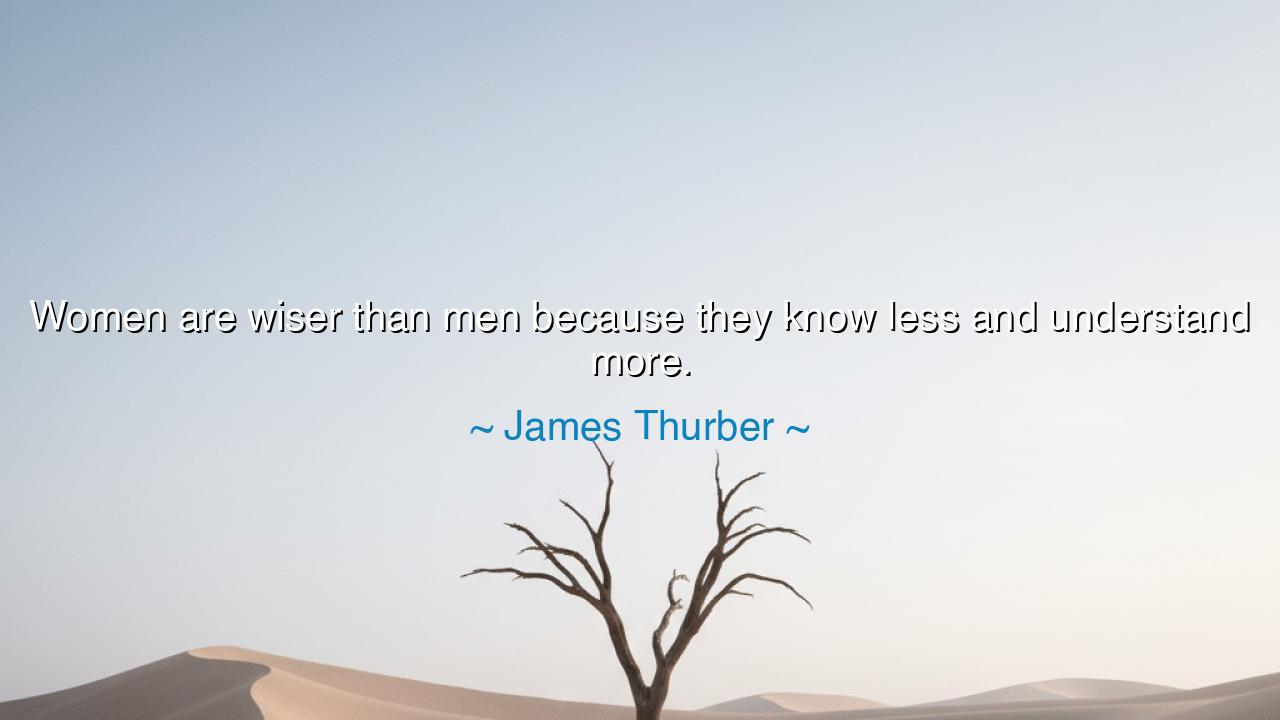
Women are wiser than men because they know less and understand






Hear the words of James Thurber, satirist and observer of human nature, who declared with wit and wisdom: “Women are wiser than men because they know less and understand more.” At first glance these words may seem like jest, yet behind them lies a truth as old as time. He does not belittle knowledge, nor does he diminish the mind of men. Rather, he raises up the gift of understanding, the wisdom of intuition, the insight born not from books or pride, but from the quiet perception of the heart.
The origin of this saying comes from Thurber’s keen eye for the follies of human nature. He saw how men, so often armed with facts, logic, and ambition, could stumble in blindness when it came to the subtleties of life. They might “know” many things—laws, figures, arguments—yet fail to “understand” the deeper meaning of relationships, emotions, and the mysteries of the soul. Women, by contrast, often carried less of the burden of formal knowledge in Thurber’s day, but they compensated with a profound understanding of the unspoken, the delicate, the hidden.
History bears witness to this truth. Consider the story of Abigail Adams, wife of John Adams, one of the founding fathers of America. While he was steeped in books, politics, and debate, it was she who warned him, “Remember the ladies.” Though denied formal education equal to his, she possessed an understanding of justice and human dignity that surpassed the mere knowledge of laws. Her counsel shaped his thought, her insight outlasted his arguments. She knew less by study, but understood more by heart.
The ancients too exalted such wisdom. The Oracle of Delphi, though shrouded in mystery, was revered not for knowledge gathered through scrolls, but for her understanding of the divine whispers that others could not hear. Kings and generals sought her counsel, not because she possessed libraries, but because she perceived truths beyond reason’s grasp. Thurber’s words echo this eternal truth: wisdom is not always the child of knowledge, but often the mother of understanding.
The meaning of the quote, then, is both humorous and profound. It warns against the arrogance of thinking that to “know” much is to be wise. Knowledge can fill the mind but leave the heart empty. Understanding penetrates deeper—it listens, observes, empathizes, and grasps the essence of things. Thus, Thurber lifts up the overlooked strength of women, who through patience, intuition, and compassion often perceive more of life’s truths than men armed only with intellect.
The lesson is clear: do not confuse knowing with wisdom. A man may memorize books and still be blind to his neighbor’s sorrow. A woman may not hold the same store of knowledge, yet her understanding of human nature may lead her closer to truth. Therefore, seek not only to know, but to understand. To listen deeply, to feel with others, to perceive what lies beyond words—this is the essence of wisdom.
Practical actions follow from this. Cultivate humility in learning: do not boast of what you “know,” but ask what you truly “understand.” In every conversation, listen more than you speak. Honor the insights of others, especially when they come not from scholarship, but from lived experience. And strive to balance knowledge with empathy, reason with compassion, intellect with intuition. In this harmony lies true wisdom.
Thus, let Thurber’s words be remembered not as jest, but as teaching: “Women are wiser than men because they know less and understand more.” For in every age, it is not the accumulation of facts that saves mankind, but the deep understanding of what makes us human. Knowledge builds towers, but understanding builds bridges; knowledge may divide, but understanding unites. And in this unity lies the path to true wisdom.






AAdministratorAdministrator
Welcome, honored guests. Please leave a comment, we will respond soon